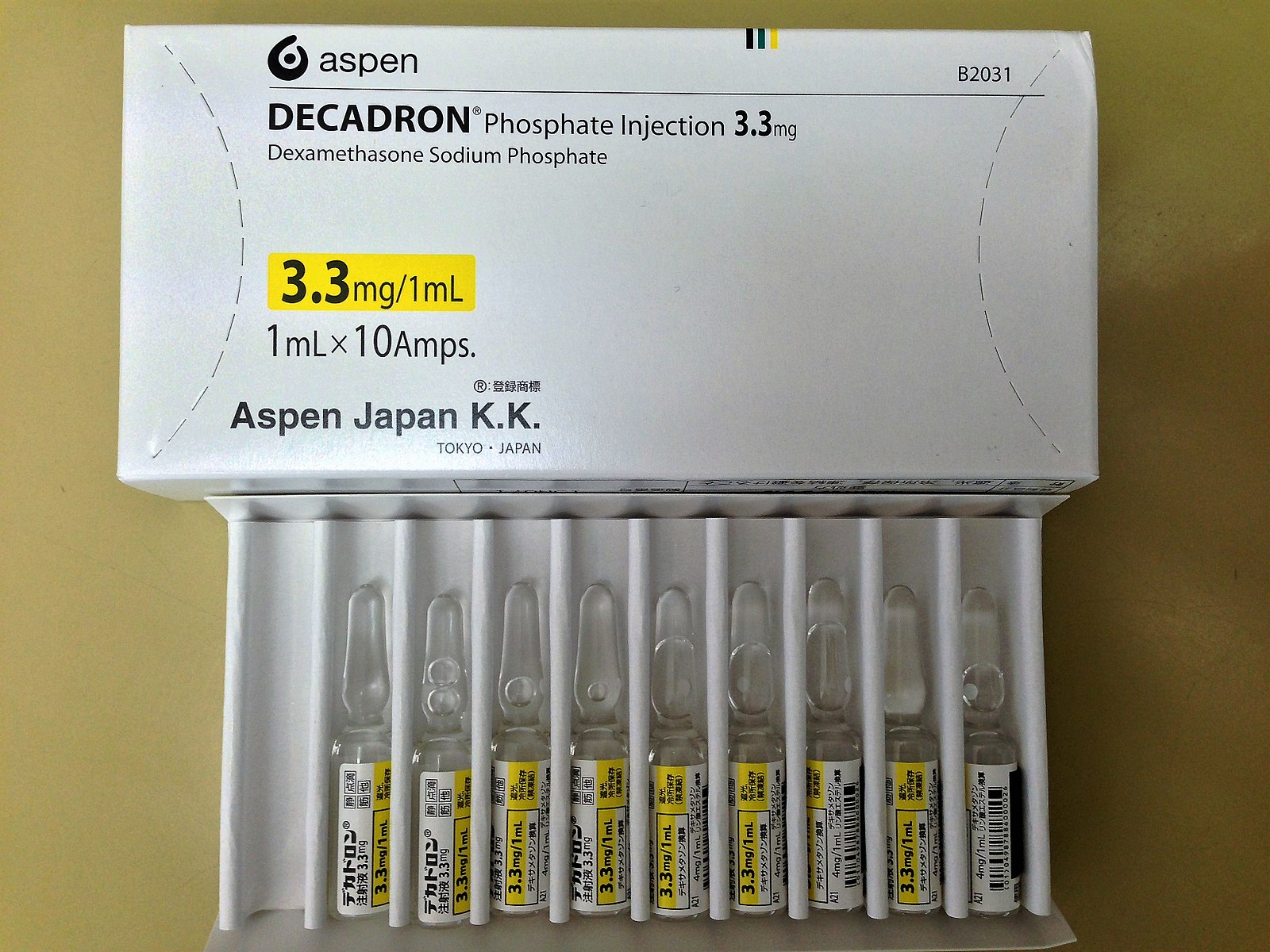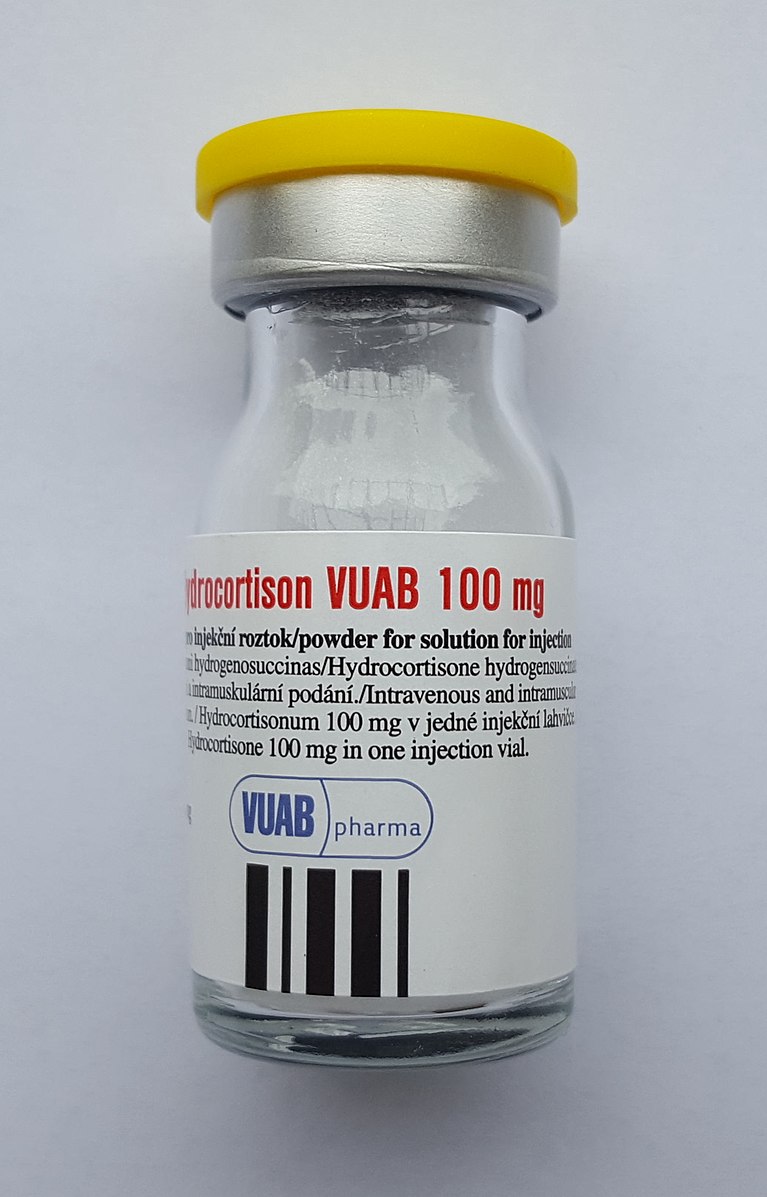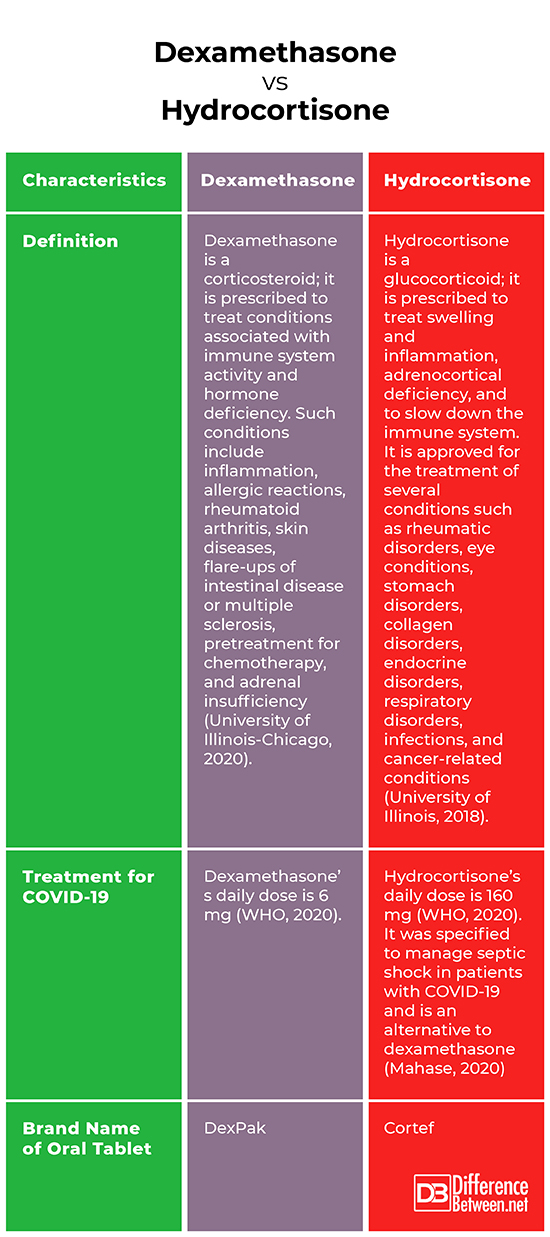Difference Between Dexamethasone and Hydrocortisone
Both dexamethasone and hydrocortisone are steroids, they belong to a class of drug which lowers inflammation and immune system activity. These are strongly recommended by the World Health Organization (WHO) to be given intravenously or orally for the treatment of patients with critical and severe coronavirus disease (COVID-19). Dexamethasone’s daily dose is 6 mg which is equivalent to 160 mg of hydrocortisone. However, these should not be used for those with non-severe COVID-19 unless they are already taking such medication for another condition (2020). The following discussions delve into their differences.

What is Dexamethasone?
Dexamethasone is a corticosteroid; it is prescribed to treat conditions associated with immune system activity and hormone deficiency. Such conditions include inflammation, allergic reactions, rheumatoid arthritis, skin diseases, flare-ups of intestinal disease or multiple sclerosis, pretreatment for chemotherapy, and adrenal insufficiency (University of Illinois-Chicago, 2020).
According to the WHO (2020), dexamethasone was found to have benefits for critically ill patients with COVID-19 in the United Kingdom’s national clinical trial, Randomised Evaluation of COVID-19 Therapy (RECOVERY). The drug was able to reduce the mortality of patients on ventilators by about one third and the mortality of patients requiring oxygen by about one fifth. Dexamethasone’s daily dose is 6 mg.
The tablet is available as a generic drug and as the brand name drug DexPak. It comes as an oral tablet, oral solution, ear drops, and eye drops. It is also given intravenously (as in the treatment of severe COVID-19); the injectable or intraocular solution may be given after surgery (only by a healthcare provider).
The common side effects include nausea, edema, headache, mood changes, difficulty falling asleep, anxiety, high blood sugar level, and high blood pressure. The serious side-effects include unusual tiredness, blood in stool or urine, abdominal bloating, infection (fever, muscle aches, and joint pain), severe mood shifts or personality changes, darkened skin color, stomach ulcers, congestive heart failure, and osteoporosis. Dexamethasone may interact with other medications, vitamins, or herbs such as antibiotics, antifungal drugs, blood thinners, cholesterol drugs, Cushing’s syndrome drugs, diabetes drugs, diuretics, epilepsy drugs, heart drugs, hormones, HIV drugs, nonsteroidal anti-inflammatory drugs (NSAIDs), and vaccines (i.e., MMR, intranasal flu, smallpox, chicken pox, rotavirus, yellow fever, and typhoid). Moreover, dexamethasone can cause allergic reactions such as trouble breathing and swelling of throat or tongue (University of Illinois-Chicago, 2020).

What is Hydrocortisone?
Hydrocortisone is a glucocorticoid; it is prescribed to treat swelling and inflammation, adrenocortical deficiency, and to slow down the immune system. It is approved for the treatment of several conditions such as rheumatic disorders, eye conditions, stomach disorders, collagen disorders, endocrine disorders, respiratory disorders, infections, and cancer-related conditions. This medication comes in many forms including an oral tablet which is available both in a generic form and the brand name drug Cortef (University of Illinois, 2018).
Hydrocortisone is also utilized to manage septic shock in patients with COVID-19 (National Institute of Health, 2021). It can be used as an alternative to dexamethasone as it was found out to reduce the risk of death by about a third (Mahase, 2020). The daily dose of hydrocortisone for the treatment of severe to critical COVID-19 is 160 mg (WHO, 2020).
The common side effects include headaches, muscle weakness, and skin problems (i.e., acne, thin skin, or shiny skin). The serious side effects include fever, sore throat, pain when urinating, wounds that would not heal, depression, mood swings, vision problems (i.e., blind spot, distorted vision, or objects looking smaller), back pain, high blood pressure, tremors, high blood sugar level, unusual tiredness, swelling of legs, and seizures. The allergic reactions include hives, swelling of face, tongue, or lips, breathing problems, skin rash, and itching. Hydrocortisone may interact with other medications such as mifepristone, seizure drugs, antibiotics, antifungal drugs, ephedrine, vaccines, blood thinners, and NSAIDs (University of Illinois, 2018).
Difference between Dexamethasone and Hydrocortisone
Definition
Dexamethasone is a corticosteroid; it is prescribed to treat conditions associated with immune system activity and hormone deficiency. Such conditions include inflammation, allergic reactions, rheumatoid arthritis, skin diseases, flare-ups of intestinal disease or multiple sclerosis, pretreatment for chemotherapy, and adrenal insufficiency (University of Illinois-Chicago, 2020). In comparison, hydrocortisone is a glucocorticoid; it is prescribed to treat swelling and inflammation, adrenocortical deficiency, and to slow down the immune system. It is approved for the treatment of several conditions such as rheumatic disorders, eye conditions, stomach disorders, collagen disorders, endocrine disorders, respiratory disorders, infections, and cancer-related conditions (University of Illinois, 2018).
Treatment for COVID-19
Dexamethasone’s daily dose is 6 mg which is equivalent to 160 mg of hydrocortisone (WHO, 2020). Moreover, hydrocortisone was specified to manage septic shock in patients with COVID-19 and is an alternative to dexamethasone (Mahase, 2020).
Brand Name
The brand name drug of dexamethasone oral tablets is DexPak (University of Illinois-Chicago, 2020) while that of hydrocortisone is Cortef (University of Illinois, 2018).
Dexamethasone vs Hydrocortisone

Summary
- Both dexamethasone and hydrocortisone are steroids, they belong to a class of drug which lowers inflammation and immune system activity.
- These are strongly recommended by the WHO for the treatment of patients with critical and severe COVID-19.
- The brand name drug of dexamethasone oral tablets is DexPak while that of hydrocortisone is Cortef.
- Difference Between Hematoma and Melanoma - February 9, 2023
- Difference Between Bruising and Necrosis - February 8, 2023
- Difference Between Brain Hematoma and Brain Hemorrhage - February 8, 2023
Search DifferenceBetween.net :
Leave a Response
References :
[0]Mahase, E. (2020). Covid-19: Hydrocortisone can be used as an alternative to dexamethasone, review finds. The BMJ. https://www.bmj.com/content/370/bmj.m3472
[1]National Institutes of Health. (2021). Corticosteroids. https://www.covid19treatmentguidelines.nih.gov/immunomodulators/corticosteroids/#:~:text=Hydrocortisone%20is%20commonly%20used%20to,COVID%2D19%20for%20more%20information.
[2]University of Illinois-Chicago. (2020). Dexamethasone, oral tablet. Medical News Today. https://www.medicalnewstoday.com/articles/322409
[3]University of Illinois. (2018). Hydrocortisone, oral tablet. Healthline. https://www.healthline.com/health/hydrocortisone-oral-tablet
[4]World Health Organization. (2020). Corona virus disease: Dexamethasone. https://www.who.int/news-room/q-a-detail/coronavirus-disease-covid-19-dexamethasone
[5]Image credit: https://commons.wikimedia.org/wiki/File:Hydrocortisone_100mg_vial_white_background.jpg
[6]Image credit: https://commons.wikimedia.org/wiki/File:Dexamethasone.jpg
